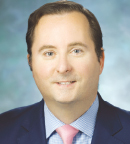As reported in The New England Journal of Medicine by Ronan J. Kelly, MBBCh, MBA, and colleagues, an interim analysis of the phase III CheckMate 577 trial has shown a significant improvement in disease-free survival with adjuvant nivolumab vs placebo in patients with resected esophageal or gastroesophageal junction cancer who had received neoadjuvant chemoradiotherapy.
As noted by the investigators, “No adjuvant treatment has been established for patients who remain at high risk for [disease] recurrence after neoadjuvant chemoradiotherapy and surgery for esophageal or gastroesophageal junction cancer.”

Ronan J. Kelly, MBBCh, MBA
Study Details
The double-blind trial included 794 patients from sites in 29 countries with resected (R0) stage II or III esophageal or gastroesophageal junction cancer who had received neoadjuvant chemoradiotherapy and had residual pathologic disease. They were randomly assigned 2:1 between July 2016 and August 2019 to receive nivolumab at 240 mg every 2 weeks for 16 weeks followed by 480 mg every 4 weeks (n = 532) or placebo (n = 262).
The maximum duration of the trial intervention period was 1 year. The primary endpoint was disease-free survival.
Disease-Free Survival
At the time of interim analysis (clinical data cutoff in May 2020), median follow-up was 24.4 months (range = 6.2–44.9 months). Median disease-free survival was 22.4 months (95% confidence interval [CI] = 16.6–34.0 months) in the nivolumab group vs 11.0 months (95% CI = 8.3–14.3 months) in the placebo group (hazard ratio [HR] = 0.69, 96.4% CI = 0.56–0.86, P < .001).
Disease-free survival favored nivolumab across all prespecified subgroups examined, including among 89 vs 40 patients with known tumor cell PD-L1 expression ≥ 1% (median = 19.7 vs 14.1 months, HR = 0.75, 95% CI = 0.45–1.24) and among 374 vs 196 patients with known expression < 1% (median = 21.3 vs 11.1 months, HR = 0.73, 95% CI = 0.57–0.92). In a post hoc analysis, nivolumab was associated with benefit among 376 vs 187 patients with adenocarcinoma (median = 19.4 vs 11.1 months, HR = 0.75, 95% CI = 0.59–0.96) and among 155 vs 75 patients with squamous cell carcinoma (median = 29.7 vs 11.0 months, HR = 0.61, 95% CI = 0.42–0.88).
Distant recurrence occurred in 29% vs 39% of patients and locoregional recurrence in 12% vs 17%. Median distant metastasis–free survival was 28.3 months (95% CI = 21.3 months–not estimable) in the nivolumab group vs 17.6 months (95% CI = 12.5–25.4 months) in the placebo group (HR = 0.74, 95% CI = 0.60–0.92).
KEY POINTS
- Adjuvant nivolumab significantly prolonged disease-free survival vs placebo.
- Nivolumab benefit was observed irrespective of PD-L1 expression status or histology.
Adverse Events
Grade 3 or 4 adverse events of any cause occurred in 34% of patients in the nivolumab group vs 32% in the placebo group. Serious adverse events of any cause occurred in 30% of patients in each group. Treatment was discontinued due to adverse events of any cause in 13% vs 8%. Among adverse events considered related to study treatment, grade 3 or 4 adverse events occurred in 13% vs 6% of patients, serious adverse events occurred in 8% vs 3%, and adverse events led to discontinuation of treatment in 9% vs 3%. The most common adverse events of any grade considered related to treatment were fatigue (17%), diarrhea (17%), pruritus (10%), and rash (10%) in the nivolumab group, and diarrhea (15%) and fatigue (11%) in the placebo group.
The investigators concluded, “Among patients with resected esophageal or gastroesophageal junction cancer who had received neoadjuvant chemoradiotherapy, disease-free survival was significantly longer among those who received nivolumab adjuvant therapy than among those who received placebo.”
Disclosure: The study was funded by Bristol Myers Squibb and Ono Pharmaceutical. For full disclosures of the study authors, visit nejm.org.

